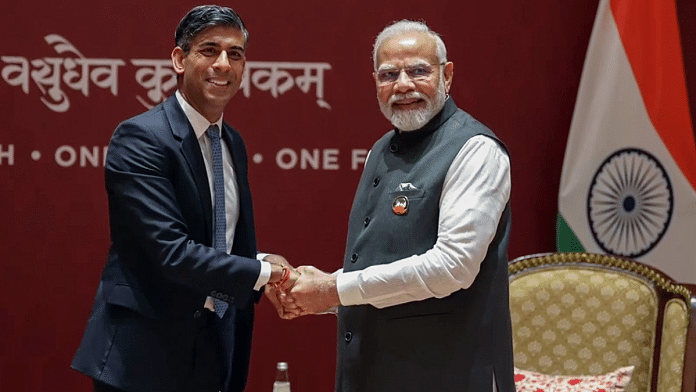New Delhi: The Free Trade Agreement (FTA) negotiations between India and the UK entered the 13th round Monday, amid indications that trade ministries are slowly playing a “limited role” and that the upcoming elections in both countries may have a bearing on the final outcome of the deal.
Prime Minister Narendra Modi and UK PM Rishi Sunak agreed to “work at pace” towards an FTA while meeting on the sidelines of the G20 summit in Delhi earlier this month. The Sunak administration has, however, maintained that it doesn’t plan to alter its migration policies, including student visas, to secure the deal.
While the UK has been pushing for greater access in sectors of liquor and automobiles, India is vying for easier mobility and visa rules for Indian companies, among other aspects. Agreement on rules of origin and a bilateral investment treaty are also pending.
Speaking to ThePrint, a trade expert involved in the ongoing negotiations said, the two trade ministers — India’s Piyush Goyal and UK’s Kemi Badenoch — are now playing a limited role, and that politics and elections are influencing the deal.
“Of the 26 chapters [in the FTA], 19 have been closed and discussions on sensitive issues, such as informal labour, are still taking place. Trade ministers have a limited role now because both countries are going for an election,” the expert said.
The expert added: “Sunak may push the trade deal before the UK’s general elections [due by January 2025], so it can be used as a campaigning tool for the Conservative Party.”
Kevin McCole, managing director, UK India Business Council, also noted that elections are now playing a role.
“The talks [are] entering an important phase, partly because the forthcoming elections introduce an element of time pressure and partly because the negotiators have done an excellent job in getting close to a deal. But there is still work for the governments to do…,” he told ThePrint.
India is slated to go to polls in May 2024 and the UK is expected to hold elections no later than January 2025.
The two countries began negotiating an FTA in 2021. Bilateral trade stood at $20.36 billion in 2022-23, and over the past five years, India’s exports have been higher than British imports by about $2-3 billion, according to data from Indian commerce ministry.
Asked what are the priority issues in the ongoing round of talks, an official from the Indian commerce ministry said, “big-ticket items” that are commercially important for both countries are on the table, but did not offer specifics.
“Learning from the past, we are not setting timelines in order to ensure that negotiations can be as robust as possible,” the official told ThePrint over the phone.
The two countries failed to meet their ‘Diwali deadline’ in late October last year. This was around the time that political uncertainty gripped the UK — Boris Johnson resigned as PM over the alleged partygate scandal and was replaced by Liz Truss who only served 44 days before she, too, resigned and handed the baton over to Sunak.
Incidents that have caused tensions between the two countries have also impacted the negotiations.
Asked whether politics and elections are now the guiding factors with regard to the FTA, the commerce ministry official said, “We’ve had political guidance from the beginning”.
‘Fundamental differences’
In 2016, the UK was among India’s top 10 major trading partners, but today, it doesn’t figure in that list.
Meanwhile, India has reportedly emerged as the UK’s third-largest services exporter and sixth-largest non-EU trading partner.
Bilateral trade is currently limited to a few categories of goods, and India continues to be a high-tariff country on products such as liquor.
Former High Commissioner to the UK, Ruchi Ghanashyam, pointed out that there are fundamental differences between India and the UK’s approach to the FTA.
“The UK wants greater access to India’s goods market, and India wants access when it comes to services in the UK. It’s sort of an existential question for the UK leadership, which has already taken a strong stance on migration,” she told ThePrint.
Ghanashyam added: “But Modi and Sunak’s conversation at G20 as well as the high number of negotiation rounds indicate persistence on both sides to address these fundamental differences.”
The UK has also been pushing for a bilateral investment treaty, something India currently does not share with other advanced countries it has FTAs with, such as Australia. A treaty like this would provide UK investors with certain protections or legal recourse in India.
Meanwhile, a British High Commission spokesperson told ThePrint that FTA talks are now focussed on “complex and technical areas”. “The UK will only sign when we have a deal that is fair, reciprocal, and ultimately in the best interests of the British people and the economy,” he added.
Since 2021, certain incidents have also created a tense backdrop for the FTA negotiations.
For instance, UK Home Secretary Suella Braverman sparked a row last year when she reportedly singled out Indians as the “largest group of people who overstay” their visas in the UK. The Indian mission in London later reportedly stated that New Delhi is committed to working with the UK to facilitate the return of Indian citizens who have overstayed their visa period.
Earlier this year, after Sikh extremists attacked the Indian mission in London and took down the Indian flag, British reports emerged that New Delhi “disengaged” from trade talks and that dialogue could proceed “without a public condemnation of the Khalistan movement”. However, the Indian government sources denied such reports.
(Edited by Richa Mishra)



